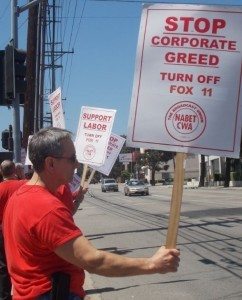
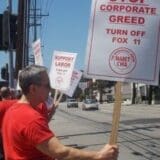
This week we mark the 50th anniversary of the March on Washington and Martin Luther King’s “I Have a Dream” speech. Few would argue about the importance of Dr. King in U.S. history and the decisive role he played in the civil rights movement. Soon after his death, a campaign began to have King’s birthday declared a national holiday. Over six million signatures were collected on a petition to Congress to pass such a law, in what has been called “the largest petition in favor of an issue in U.S. history.”
Martin Luther King Jr. Day became a federal holiday in 1986.
Fourteen years later, MLK Day was observed in all 50 U.S. states for the first time.
And in 2006, Greenville County, South Carolina became the last county in the U.S. to officially make MLK Day a paid holiday.
Growing numbers of private employers also consider MLK Day a holiday.
» Read more about: L.A.’s Fox TV Strips MLK Day from Union Contract »
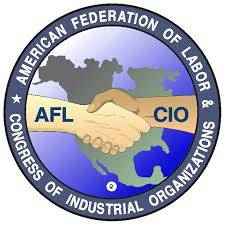
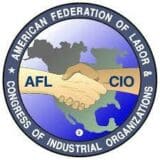
 Union leaders and activists from around the country, in Los Angeles September 8 for the AFL-CIO Convention, will get a close look at a regional labor movement with membership numbers holding steady or even slightly increasing.
Union leaders and activists from around the country, in Los Angeles September 8 for the AFL-CIO Convention, will get a close look at a regional labor movement with membership numbers holding steady or even slightly increasing.
Compare this with much of the U.S., where the percentage of workers represented by unions is dropping rapidly and persistently.
L.A., more than most cities (and California, more than most states) has stayed a step ahead of an employer class determined to cleanse the global economy of collective worker power.
Credit Los Angeles and statewide unions for building tightly run coalitions with immigrant-rights and economic-justice groups; their brassy leadership and an electoral strategy which has – so far, at least – beaten back anti-union measures like Proposition 32.
AFL-CIO delegates from the de-industrialized Midwest, by contrast, have been facing relentless attacks from Republican governors and legislatures fronting right-to-work drives and laws restricting public employee bargaining rights.
» Read more about: AFL-CIO Convention Comes to Los Angeles »
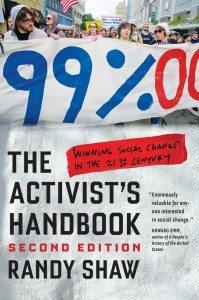

 Last Saturday’s commemoration of the 1963 March on Washington spotlighted the power of grassroots activism. But it was no exercise in nostalgia. Activists are pushing for social change across the nation, and I discuss dozens of these campaigns in my new book, The Activist’s Handbook, Second Edition: Winning Social Change in the 21st Century, officially released today by UC Press. The book thoroughly revises and updates the 1996 edition, which the late Howard Zinn praised as “enormously valuable for anyone interested in social change.” The new edition adds my analysis of the strategies used by social movements around immigration reform, gay and lesbian rights, the Keystone XL Pipeline, school “reform” and other campaigns that really took off in the past decade.
Last Saturday’s commemoration of the 1963 March on Washington spotlighted the power of grassroots activism. But it was no exercise in nostalgia. Activists are pushing for social change across the nation, and I discuss dozens of these campaigns in my new book, The Activist’s Handbook, Second Edition: Winning Social Change in the 21st Century, officially released today by UC Press. The book thoroughly revises and updates the 1996 edition, which the late Howard Zinn praised as “enormously valuable for anyone interested in social change.” The new edition adds my analysis of the strategies used by social movements around immigration reform, gay and lesbian rights, the Keystone XL Pipeline, school “reform” and other campaigns that really took off in the past decade.
While some believe the past 15 years have weakened the power of grassroots activism against big moneyed interests, I disagree. In fact, in writing the new book I realized that activism has increased since the original edition,


Tonight, port truck drivers employed by Green Fleet Systems, which contracts with companies like Skechers and Huffy bikes to haul cargo containers on and off the Ports of Los Angeles and Long Beach, began a 24-hour Unfair Labor Practice strike. The strike started at 5 p.m., the beginning of the night shift, and will continue through Tuesday when the day shift arrives. As a Green Fleet day shift driver, I will be joining the night shift picket line and then will be on strike myself starting at 5 a.m. Tuesday. We are striking to protest harassment and intimidation by Green Fleet management.
I have been a port truck driver for 13 years. I have been driving for Green Fleet Systems (GFS), based in Carson, for the last three years. During my time as a port truck driver, I have seen how the port trucking industry works. Port drivers like me are often kept at low wages with few benefits,
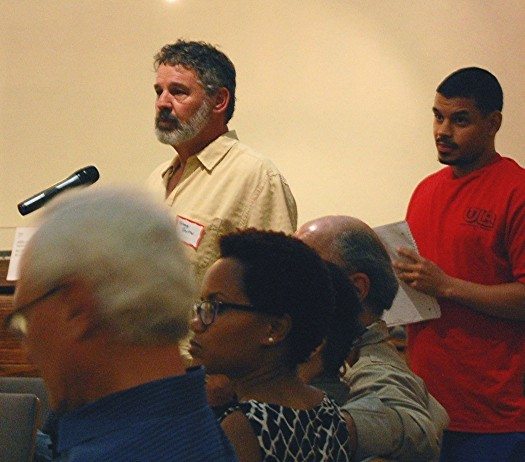

The topic of last Thursday’s roundtable discussion hosted by the West Los Angeles Democratic Club was “The Privatization of Public Schools.” About 80 Democratic activists and Los Angeles Unified School District teachers at Mar Vista’s St. Bede’s Episcopal Church heard teacher and former congressional candidate Marcy Winograd moderate a discussion of such hot-button issues as charter schools, co-locations, Parent Trigger and federal learning-standards-based programs such as No Child Left Behind.
Panelists included LAUSD Board member Steve Zimmer, United Teachers L.A./National Education Association Vice President M.J. Roberts, Crossroads School for the Arts & Sciences founder and charter school advocate Paul Cummins, middle school teacher Loren Scott, former middle school principal Marcia Haskin and LAUSD parent and education blogger Sara Roos.
The evening’s harshest words were reserved for LAUSD Superintendent John Deasy and Parent Trigger, the controversial law that allows 50 percent-plus-one of parents from an under-performing school to fire the staff and start over.
» Read more about: School Privatization Critics Slam Parent Trigger Law »
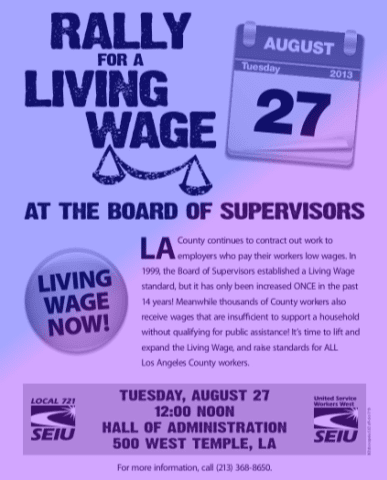
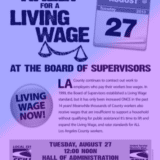
In 1999 the Los Angeles County Board of Supervisors approved a Living Wage Ordinance applicable to private businesses that contract with the county to provide certain services, including landscaping, janitorial and security. The reason for the ordinance was simple: The state’s minimum wage at the time — $5.75 per hour—was insufficient and the failure of some county contractors to pay their workers living wages was placing financial burdens on L.A. County by causing these employees to use social and health services provided by the county.
The board set the living wage initially at $9.46 per hour without health benefits, or at $8.32 per hour if an employer offered health benefits worth at least $1.14 per hour. Since then, the living wage has been raised only once, in 2006, when the board approved an increase to the current level of $11.84 per hour without health benefits, or $9.64 with health benefits valued at $2.20 per hour.
» Read more about: Rally to Raise L.A. County’s Living Wage »
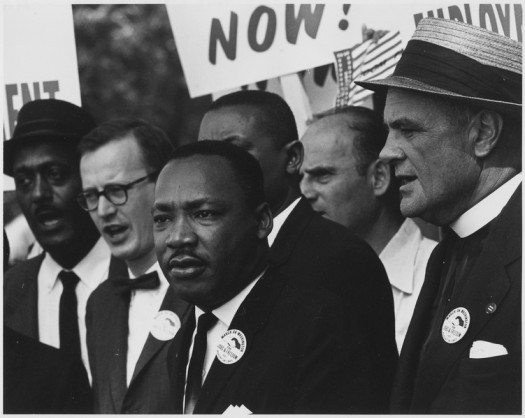
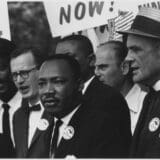
 What would the Rev. Martin Luther King Jr. march for if he were alive today?
What would the Rev. Martin Luther King Jr. march for if he were alive today?
America has made progress on many fronts in the half-century since King electrified a crowd of 200,000 people, and millions of Americans watching on television, with his “I Have a Dream” address at the March on Washington for Jobs and Freedom. But there is still much to do to achieve his vision of equality.
Fortunately, many Americans are involved in grass-roots movements that follow in his footsteps. King began his activism as a crusader against racial segregation, but he soon recognized that his battle was part of a much broader fight for a more humane society. Today, at age 84, King would no doubt still be on the front lines, lending his voice and his energy to major battles for justice.
Voting rights: Along with other civil rights leaders,
» Read more about: Martin Luther King Jr.’s Spirit Is Still Marching »


See original feature by Gary Cohn, “Interpreter Bill Would Help Save Lives Lost in Translation.”
» Read more about: Lalo Alcaraz on California’s Need for Medical Interpreters »


 Low-income parents and child care providers who oppose a controversial finger-scanning policy in Mississippi won a reprieve August 15 when a judge issued an order that stops its implementation – at least for now.
Low-income parents and child care providers who oppose a controversial finger-scanning policy in Mississippi won a reprieve August 15 when a judge issued an order that stops its implementation – at least for now.
Judge Denise Owens of the Chancery Court of the First Judicial District in Hinds County issued a temporary injunction, which effectively means that low-income parents whose kids are in a federally-funded voucher program that supports child care do not have to have their fingers scanned for facility pick-ups or drop offs.
The requirement applies to other adults designated to escort kids to and from participating child care facilities. The Mississippi Department of Human Services had planned on using the scans to track attendance to pay child care centers that participate in the subsidy program.
Certain requirements would have started on August 15. The scanning policy was scheduled to start throughout Mississippi,
» Read more about: Judge Blocks Fingerprint Scans for Low-Income Moms »
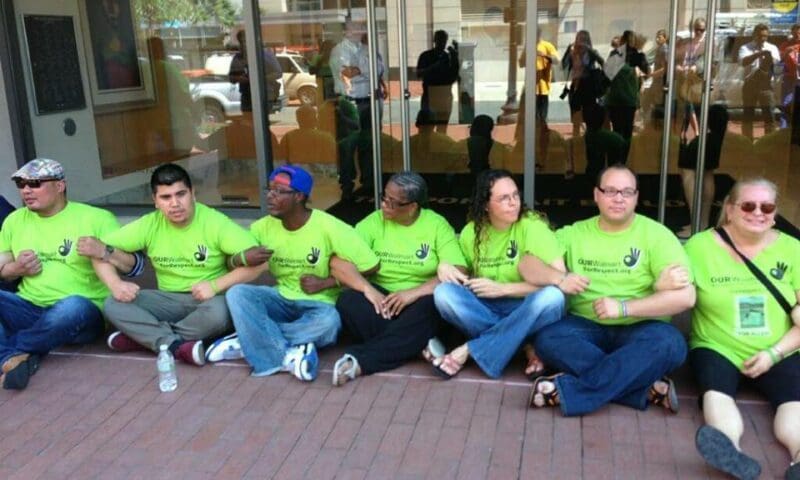

(This post first appeared on The Nation and is republished with permission.)
Nine fired workers and a current employee were arrested around 2:30 p.m. Thursday after locking arms and sitting in front of the entrance to a Washington, D.C., Walmart office. The planned act of civil disobedience concluded a noon rally at which workers announced a Labor Day deadline for Walmart to raise wages and reinstate workers they allege were fired for their activism. Twenty workers who joined a June strike by the labor group OUR Walmart have since been terminated; another 50-some have been otherwise disciplined by Walmart.
“Hopefully it opens Walmart’s eyes and lets them know that this is just the beginning,” OUR Walmart activist Barbara Collins told The Nation prior to her arrest. If Walmart doesn’t meet the Labor Day deadline, she said yesterday, “then we’re going to give them a lot more actions,
» Read more about: Walmart Gets Ready for Labor Day With Arrests »